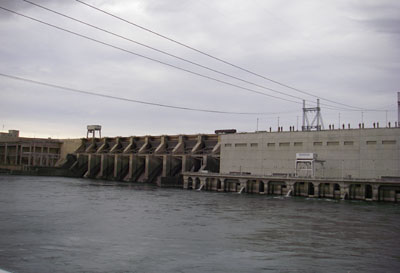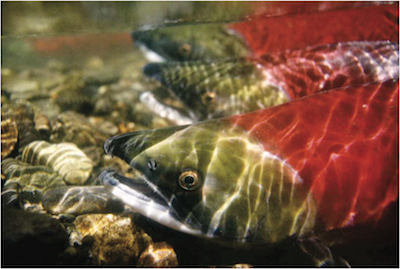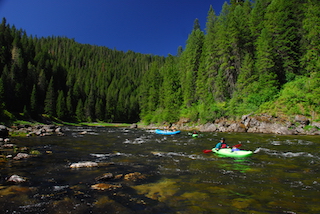 Encompassing 250,000 square miles, the Pacific Northwest’s Columbia and Snake River system represents a vast network of rivers that have served as the foundation for transportation and commerce in the region for many centuries. Before dams were constructed on these rivers, up to 16 million wild salmon returned to the Basin to spawn, making it one of the greatest salmon river systems in the world. Today, over 250 reservoirs and 150 hydropower projects, with 18 mainstem dams, have silenced the free-flowing rivers of the region, and as few as ten thousand salmon return home to the Snake River. While many factors influence the health of these rivers and their salmon runs, the biggest reason for their decline is four outdated federal dams on the lower Snake River. Since the dams were constructed, the health of the river has declined and salmon populations have plummeted by more than 90%.
Encompassing 250,000 square miles, the Pacific Northwest’s Columbia and Snake River system represents a vast network of rivers that have served as the foundation for transportation and commerce in the region for many centuries. Before dams were constructed on these rivers, up to 16 million wild salmon returned to the Basin to spawn, making it one of the greatest salmon river systems in the world. Today, over 250 reservoirs and 150 hydropower projects, with 18 mainstem dams, have silenced the free-flowing rivers of the region, and as few as ten thousand salmon return home to the Snake River. While many factors influence the health of these rivers and their salmon runs, the biggest reason for their decline is four outdated federal dams on the lower Snake River. Since the dams were constructed, the health of the river has declined and salmon populations have plummeted by more than 90%.
American Whitewater is a member of Save Our Wild Salmon (SOS), which is a nationwide coalition of conservation organizations, commercial and sport fishing associations, businesses, river groups, and taxpayer advocates who are all committed to restoring Pacific Northwest wild salmon along with the river and communities that depend on them. The coalition’s primary goal is to alter or remove the lower Snake River dams, offering a unique opportunity to restore wild salmon that depend on a free-flowing river. Restoring the river will also offer significant opportunities for new river-based recreation, providing numerous economic benefits to communities in the region. As whitewater enthusiasts we want the rivers we enjoy to be healthy, and robust salmon runs are a key part of our experience in the Pacific Northwest. Unlocking the Snake River would remove migration barriers and restore access for fish to thousands of miles of valuable cold-water habitat throughout the Basin.
Since the early 1990’s, federal courts have found several plans for restoring the salmon runs of the Columbia and Snake River to be illegal and scientifically inadequate. At each step, the federal agencies have failed to consider dam removal as a viable option for restoring the river and wild endangered salmon. In its most recent decision, the Court ordered the agencies to do so.
Learn by reviewing the Story Map ”Imagining a New Future for the Lower Snake River.”
Why Restoring a Freely Flowing Lower Snake River Is a Good Idea
 The Dams Have Disconnected the River, Driving Salmon to Extinction. Scientists say that the biggest thing that we can do to recover salmon is to remove the lower Snake River dams and reestablish a free-flowing Snake River. These dams block migration pathways for both juvenile and adult salmon, and cut off access to critical cold water tributaries like the upper reaches of the Lochsa, Selway, and Salmon River. They also make the impacts of a warming climate worse for salmon as reservoirs increase water temperatures to lethal levels. We’ve invested $15 billion in salmon recovery efforts, and yet not one species is close to recovering. It’s time to look to viable solutions that address overall river health rather than just a few of the symptoms.
The Dams Have Disconnected the River, Driving Salmon to Extinction. Scientists say that the biggest thing that we can do to recover salmon is to remove the lower Snake River dams and reestablish a free-flowing Snake River. These dams block migration pathways for both juvenile and adult salmon, and cut off access to critical cold water tributaries like the upper reaches of the Lochsa, Selway, and Salmon River. They also make the impacts of a warming climate worse for salmon as reservoirs increase water temperatures to lethal levels. We’ve invested $15 billion in salmon recovery efforts, and yet not one species is close to recovering. It’s time to look to viable solutions that address overall river health rather than just a few of the symptoms.
It’s Good for Whitewater. Unlocking the Snake River would restore river connectivity and access for fish to thousands of miles of valuable cold-water habitat throughout the Basin, including the Lochsa, Selway and Salmon Rivers. Recently, river managers have taken actions that have reduced opportunities for the public to use and enjoy rivers like the Middle Fork Salmon because they are concerned that recreational users may negatively impact diminishing salmon runs. While we support doing everything we can to protect salmon, removing the dams will address the root of the problem for salmon in the Basin.
 Additionally, freeing the Snake will restore opportunities for a 140-mile multi-day river trip on the lower mainstem river. In 2002, the US Army Corps of Engineers estimated that if the dams were removed, there will be demand for 300,000 user days for paddlesports.
Additionally, freeing the Snake will restore opportunities for a 140-mile multi-day river trip on the lower mainstem river. In 2002, the US Army Corps of Engineers estimated that if the dams were removed, there will be demand for 300,000 user days for paddlesports.
We Can Replace the Power Generated at the Dams with Economic, Fossil-Fuel Free Energy Sources. Cleaner renewable energy sources and conservation have replaced the amount of energy that the four dams generate (930 annual megawatts a year) several times over. The Northwest Power and Conservation Council concluded in 2010 that the region can meet its current and future energy needs through at least 2030 via energy efficiency and planned renewable energy sources.
The power generated at the four lower Snake River dams is not “clean and green.” This kind of energy doesn’t drive an entire species to extinction.
It Makes Economic Sense. Barging traffic fell 70% between 2001 and 2016, and local rail networks are expanding, so the need for the dams is diminishing. In the meantime, the lower Snake River dams are aging and the cost of to operating and maintaining them are steadily rising. Shippers on the lower Snake River navigation system pay only 15 cents for every dollar spent on the system, while tax and rate payers subsidize the rest.
Healthy salmon populations will deliver far greater economic benefits to the region than the increasingly costly and aging lower Snake River dams. Restoring the river will also boost the regional economy through revived recreation interest, including boating, hiking, camping and more.
We Know That Rivers Rebound Quickly After Dam Removal. We’ve seen the Elwha, White Salmon, Tuckaseegee, and many other rivers across the country–and their surrounding communities–come back to life after dam removals. Now is the time to see this result for the Columbia and Snake systems by removing the four lower Snake River dams.
